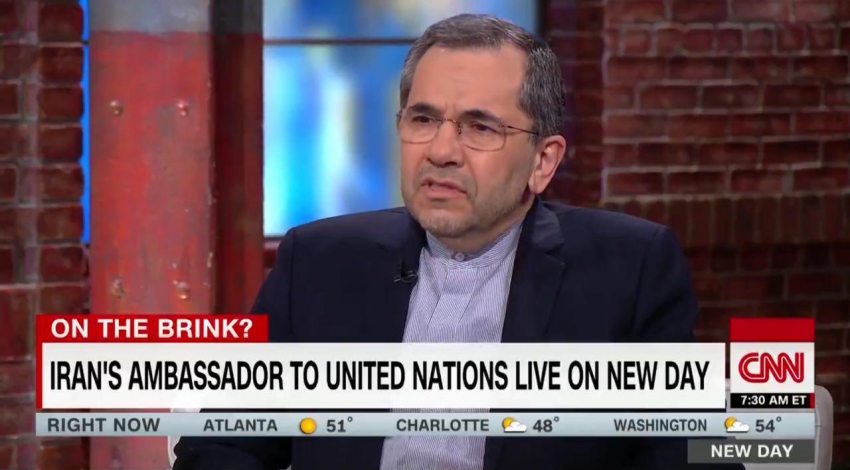Tuesday 14 May 2019 - 18:12
Story Code : 348839
Iran's UN ambassador: Nuclear weapons are 'Against Our Religion'
"Does Iran want nuclear weapons?" CNN's John Berman asked Ravanchi Tuesday morning.
"No. Because it is against our religion," the ambassador replied. "Our supreme leader has made a verdict on the prohibition of nuclear weapons. Besides, nuclear weapons are not within the defense structure of Iran."
President Trump has expressed a willingness to negotiate with Iran, even though�he's boosted economic sanctions�on the Islamic state in an effort to change Iran's aggressive conduct. Berman asked the ambassador if Iranian leaders would be willing to speak to Trump.
"You know, the policy of maximum pressure and the offer of a dialogue are mutually exclusive," Ravanchi said. "They cannot expect Iran to accept an offer under pressure. Why? The policy of maximum pressure is creating problems for the Iranian people. We can't accept a dialogue based on coercion, based on intimidation and threats."
Last week, the Trump administration sent an aircraft carrier group and a bomber task force to the Middle East in a message to Iran and its proxies.
�In response to a number of troubling and escalatory indications and warnings, the United States is deploying the USS Abraham Lincoln Carrier Strike Group and a bomber task force to the U.S. Central Command region to send a clear and unmistakable message to the Iranian regime that any attack on United States interests or on those of our allies will be met with unrelenting force,� National Security Adviser John Bolton said in a statement.
On Tuesday, Ravanchi dismissed the perceived threat from Iran as "fake intelligence based on certain narrow minded agenda, as I said, pursued by certain people in Washington, as well as in our region. They are making up these allegations in order to create fake stories."
Ravanchi also dismissed a New York Times report saying that National Security Adviser Bolton directed Acting Defense Secretary Pat Shanahan to produce a plan to send up to 120,000 U.S. troops to the Middle East in case Iran attacks American troops or interests in the region or resumes its work on nuclear weapons.
"What's your reaction to these plans?" Berman asked the ambassador.
"These are all psychological warfare, in our opinion. We are not in the business of trying to create a conflict in our neighborhood. Because nobody is going to have benefit from such a conflict in our region, except for a few, as I explained earlier, some people in Washington and some countries in our neighborhood (he earlier mentioned Israel and Saudi Arabia).
On Monday, President Trump told reporters he'll see what happens with Iran: "If they do anything, they will suffer greatly," he said.
Berman asked the ambassador what he thinks the president means:
"I don't know. You should ask him," Ravanchi said. "Iran is having great relations with our neighbors. Iran is in the Persian Gulf area. We are not in Gulf of Mexico. So these questions should be directed to those people who have come to our neighborhood from thousands of miles. So we are there. We are protecting our interest in our neighborhood, and we are protecting the safety and security of the Persian Gulf area."
On another topic, Ravanchi said Iran was "definitely not" involved in the attack on four tankers in the Persian Gulf region: He accused "certain people in Washington" and others in the Middle East (Israelis and Saudis) of "spreading these lies to provoke, to prepare the ground for a conflict in our neighborhood."
# Tags











